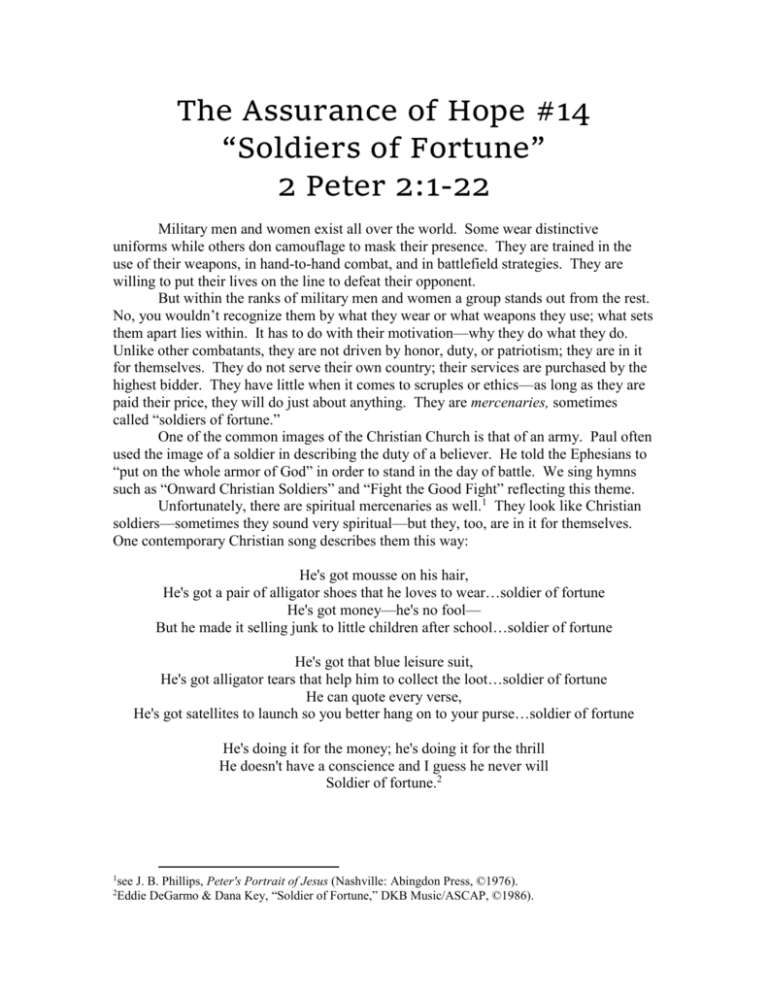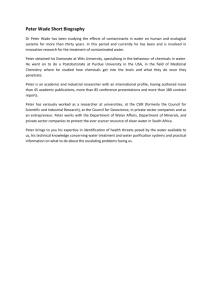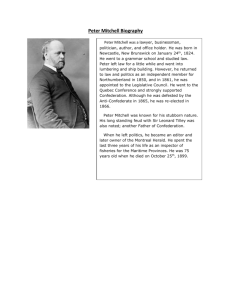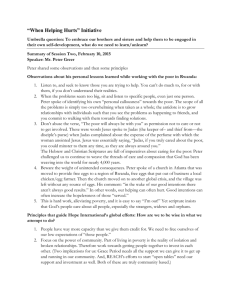Soldiers of Fortune - Texas Christian Church
advertisement

The Assurance of Hope #14 “Soldiers of Fortune” 2 Peter 2:1-22 Military men and women exist all over the world. Some wear distinctive uniforms while others don camouflage to mask their presence. They are trained in the use of their weapons, in hand-to-hand combat, and in battlefield strategies. They are willing to put their lives on the line to defeat their opponent. But within the ranks of military men and women a group stands out from the rest. No, you wouldn’t recognize them by what they wear or what weapons they use; what sets them apart lies within. It has to do with their motivation—why they do what they do. Unlike other combatants, they are not driven by honor, duty, or patriotism; they are in it for themselves. They do not serve their own country; their services are purchased by the highest bidder. They have little when it comes to scruples or ethics—as long as they are paid their price, they will do just about anything. They are mercenaries, sometimes called “soldiers of fortune.” One of the common images of the Christian Church is that of an army. Paul often used the image of a soldier in describing the duty of a believer. He told the Ephesians to “put on the whole armor of God” in order to stand in the day of battle. We sing hymns such as “Onward Christian Soldiers” and “Fight the Good Fight” reflecting this theme. Unfortunately, there are spiritual mercenaries as well.1 They look like Christian soldiers—sometimes they sound very spiritual—but they, too, are in it for themselves. One contemporary Christian song describes them this way: He's got mousse on his hair, He's got a pair of alligator shoes that he loves to wear…soldier of fortune He's got money—he's no fool— But he made it selling junk to little children after school…soldier of fortune He's got that blue leisure suit, He's got alligator tears that help him to collect the loot…soldier of fortune He can quote every verse, He's got satellites to launch so you better hang on to your purse…soldier of fortune He's doing it for the money; he's doing it for the thrill He doesn't have a conscience and I guess he never will Soldier of fortune.2 1 2 see J. B. Phillips, Peter's Portrait of Jesus (Nashville: Abingdon Press, ©1976). Eddie DeGarmo & Dana Key, “Soldier of Fortune,” DKB Music/ASCAP, ©1986). Sound familiar? Just turn on the television and you can see people just like this, those Paul described as ‘men of corrupt mind, who have been robbed of the truth and who think that godliness is a means to financial gain’ (1 Tim. 6:5). Soldiers of fortune! As you probably figured out, these spiritual mercenaries are not unique to our age. From the beginning of the Christian Church there have been false prophets and teachers trying to capitalize for themselves by means of the gospel. Jesus warned in Matthew 7:15-16, “Watch out for false prophets. They come to you in sheep's clothing, but inwardly they are ferocious wolves.” Paul told Ephesian church in Acts 20:28-31, Keep watch over yourselves and all the flock of which the Holy Spirit has made you overseers. Be shepherds of the church of God, which he bought with his own blood. I know that after I leave, savage wolves will come in among you and will not spare the flock. Even from your own number men will arise and distort the truth in order to draw away disciples after them. So be on your guard! As we continue our study of Second Peter, we come to a lengthy passage (all of chapter two) dealing with these “soldiers of fortune.” David O’Brien (my Old Testament professor at St. Paul Bible College) writes, Second Peter attacks false teachers who were lawless, libertine, and motivated by greed. But who were they? … In the first decades after Jesus’ resurrection, the church was troubled by a harmful system of thought known as Gnosticism. Its adherents, called Gnostics, were condemned as heretics early in church history, but they remained Christianity’s most potent and insidious rival for over three centuries. They believed that they had received special spiritual knowledge, or gnosis, from God, which was a special gift for them alone. They had a mystical faith concocted of unequal parts of Greek philosophy, pagan religion, and Christian teaching. One of the stranger elements of gnostic teaching involved its understanding of God. Gnostics taught that all matter was evil, including the earth and its inhabitants. Since God is good, and a spirit, He couldn’t have created this evil universe. Therefore the god of the Old Testament, who was the creator, must have been Satan rather than the God and Father of our Lord Jesus Christ! If the false teachers that Peter combated held to an early form of this Gnostic teaching, you can see how important it was for Peter’s readers to know that the God of the Christians was also the God of the Old Testament. God wanted the readers of Peter’s letter, who were troubled by the insidious doctrines of the early Gnostics, to know that the Scriptures He’d inspired, the Scriptures to which Peter turned to support the message of salvation in Christ, stood on the firmest possible foundation. Second Peter was not just a doctrinal pronouncement to affirm the inspiration of Scripture. It was also a condemnation of all that was not written under God’s direction. The massive body of gnostic writings that has come to light recently confirms the importance of this warning. Peter’s second letter was an encouragement to those whose faith had stood firm in the face of a deadly theological assault. And it was correction for those who may have come to doubt.3 The Danger of Spiritual Mercenaries Peter begins this chapter with the danger of spiritual mercenaries in verses 1-3, But there were also false prophets among the people, just as there will be false teachers among you. They will secretly introduce destructive heresies, even denying the sovereign Lord who bought them—bringing swift destruction on themselves. Many will follow their shameful ways and will bring the way of truth into disrepute. In their greed these teachers will exploit you with stories they have made up. Their condemnation has long been hanging over them, and their destruction has not been sleeping. Peter first reveals the sham of their message. He calls them “destructive heresies,” about as strong a language as he could use. “Heresies” implies false teaching or doctrine, while the word “destructive” comes from a Greek term meaning, “ruin, destruction, or eternal misery.” The word speaks of the loss of everything that makes human existence worthwhile.4 “Heresies” do not include differences of opinion on debatable matters, such as the sequence of the end times or the age of creation. Peter speaks of “denying the sovereign Lord who bought them,” meaning that their false teaching had everything to do with the person of Jesus Christ. This is what distinguishes Christianity from cults. If a group teaches that Jesus was anything less than fully God and fully man, or that His sacrifice on the cross did not fully accomplish our salvation, that group is a cult. It doesn’t matter if they use the name “Jesus” or “Christian” or quote the Bible…they are a cult! Next Peter exposes the secrecy of their ways. Not only was their message false, but their methods were false. Instead of openly declaring what they believed, they came into the church under false colors and gave the impression that they were true to the Christian faith. “They secretly bring in alongside” is the literal translation. They do not throw out the truth immediately; they simply lay their false teachings alongside the truth and give the impression that they believe the fundamentals of the faith. Before long, they remove the true doctrine and leave their false doctrine in its place.5 In verse three, Peter points out that the false teachers used “feigned words.” The Greek word is plastos, from which we get our English word plastic. Plastic words! Words that can be twisted to mean anything you want them to mean! The false teachers use our vocabulary, but they do not use our dictionary. They talk about “salvation,” “inspiration,” and the great words of the Christian faith, but they do not mean what we mean. Immature 3 David E. O'Brien, Today's Handbook for Solving Bible Difficulties (Minneapolis: Bethany House Publishers, ©1990). 4 Kenneth S. Wuest, Wuest’s Word Studies from the Greek New Testament: For the English Reader (Grand Rapids: Eerdmans, 1997, ©1984). 5 Warren W. Wiersbe, Be Alert (Wheaton, IL: Victor Books, ©1984). and untaught believers hear these preachers or read their books and think that these men are sound in the faith, but they are not.6 This leads to the shame brought about by these men. Not only are their actions shameful—later in the chapter Peter speaks of their immorality and out-of-control behavior—but they bring shame on the name of Christ and Christianity. The first and most obvious harm of false teaching is the damage it does to those who hear it. It puts an obstacle in the way of unbelievers, who may be turned away from the true way of salvation. It also does harm to believers, by causing confusion, doubt, discouragement, and disobedience.7 Paul writes in 2 Timothy 2:14, “Warn them before God against quarreling about words; it is of no value, and only ruins those who listen.” That word translated “ruin” is the Greek word katastrophē, from which we get catastrophe. False teaching has a catastrophic effect. The Greek word has the basic idea of being overturned or overthrown, and in this context it carries the more explicit connotation of being spiritually ruined. Paul is talking about teaching that intentionally subverts the truth by replacing it with falsehood. The only other use of that Greek word in the New Testament is found in our text today, where its extreme seriousness is even clearer. In verse six we read, “[God] condemned the cities of Sodom and Gomorrah to destruction [katastrophē] by reducing them to ashes, having made them an example to those who would live ungodly thereafter” [NASB].8 The danger of spiritual mercenaries is serious. No wonder Paul instructs Titus, “Warn a divisive person once, and then warn him a second time. After that, have nothing to do with him” [Titus 3:10]. They cannot be allowed to wreck havoc within the church. The Description of Spiritual Mercenaries Peter goes on to provide a description of these spiritual mercenaries. I find four characteristics in this text that are common among such “soldiers of fortune.” Each one may not exhibit all four, but you will find some combination of these traits in them. First they are insatiable. Peter says in verse three, “In their greed these teachers will exploit you…” Later in verse 14 they are called “experts in greed.” Peter likens them to the first and foremost spiritual mercenary in Scripture—Balaam—who for a price would give whatever prophecy the purchaser wanted. MacArthur writes, Balaam was available to the highest bidder, and apostates usually are motivated by money. Some of the men pastoring liberal churches, teaching false doctrine in apostate seminaries, “preaching” on TV and traveling the country asking people to send in money for their needy ministries, pay themselves handsome salaries and have become wealthy off other people. They are in the ministry for the money.9 6 Ibid. John F. MacArthur, Jr., 2 Timothy (Chicago: Moody Press, 1996, ©1995). 8 Ibid. 9 John F. MacArthur, Jr., Beware The Pretenders (Wheaton, IL: Victor Books, 1980). 7 We don’t have to look too hard to find such today. While not every preacher on television falls into this category, nearly all of the Trinity Broadcast Network does. From Paul Crouch to Kenneth Copeland to John Avanzini to Morris Cerillo to Creflo Dollar (if any man deserves his name, he does!)…they’re all begging money or trying to sell stuff to their audience. “Give a hundred dollars and you’ll get a thousand dollars back,” they promise. If that’s the case, why don’t they send me a hundred dollars so they can get their thousands! Marilyn Hickey says that by faith you can speak money into you wallet; why doesn’t she do that herself instead of spending half of her broadcast appealing for donations? Second, they are insolent. Verse ten describes them as, “Bold and arrogant, these men are not afraid to slander celestial beings.” Benny Hinn announced one evening, “I’m gonna preach and the devil is gonna fall over dead.” Satan might fall over laughing if he listened to Benny Hinn preach, but he’s not going to fall over dead! The arrogance with which these false teachers speak is astounding, claiming to be “little gods” who can create with their words just as God did in Genesis one…arrogant and absurd! Verse 11 points out, “yet even angels, although they are stronger and more powerful, do not bring slanderous accusations against such beings in the presence of the Lord.” Third, they are ignorant. Peter writes in verse 12, “But these men blaspheme in matters they do not understand. They are like brute beasts, creatures of instinct, born only to be caught and destroyed, and like beasts they too will perish.” Though they speak arrogantly and sometimes use big theological terms, most of the false prophets today don’t really know what they’re talking about! R. C. Sproul points out, Very little evidence of any significant knowledge of either church history or theology is displayed by Copeland, Hagin, Tilton, Crouch, and others. These men are not scholars. There is nothing wrong with that. Not all Christian ministers are called to be technical theologians. There are other godly vocations to be pursued than scholarly ones. What is alarming, however, is the attitude with which these “teachers” assert their novelties, claiming divine authority for charting a new course. Some of them (Crouch, for example) have been approached charitably and privately by theologians warning of these heresies, but to no avail.10 Fourth, they are immoral. Peter describes them in verses 13-14, “Their idea of pleasure is to carouse in broad daylight. They are blots and blemishes, reveling in their pleasures while they feast with you. With eyes full of adultery, they never stop sinning; they seduce the unstable; they are experts in greed—an accursed brood!” We are all too aware of the scandals surrounding Jim Bakker, Jimmy Swaggart, and others who tried to justify their immorality by twisting Scripture. Peter summarizes in verses 17-19, These men are springs without water and mists driven by a storm… For they mouth empty, boastful words and, by appealing to the lustful desires of sinful human nature, they entice people who are just escaping from those who live in error. They promise them freedom, while they themselves are slaves of depravity—for a man is a slave to whatever has mastered him. 10 Michael S. Horton, ed., The Agony of Deceit (Chicago: Moody Press, ©1990). Insatiable, insolent, ignorant, and immoral…not much good in that description! Yet people follow them by the thousands! Why? Paul clues us in with these words: For the time will come when men will not put up with sound doctrine. Instead, to suit their own desires, they will gather around them a great number of teachers to say what their itching ears want to hear. They will turn their ears away from the truth and turn aside to myths (2 Timothy 4:3-4). They are successful because they give their listeners what they want to hear! The Destruction of Spiritual Mercenaries Finally, Peter leaves no doubt as to the destruction of spiritual mercenaries: For if God did not spare angels when they sinned, but sent them to hell, putting them into gloomy dungeons to be held for judgment; if he did not spare the ancient world when he brought the flood on its ungodly people, but protected Noah, a preacher of righteousness, and seven others; if he condemned the cities of Sodom and Gomorrah by burning them to ashes, and made them an example of what is going to happen to the ungodly; and if he rescued Lot, a righteous man, who was distressed by the filthy lives of lawless men (for that righteous man, living among them day after day, was tormented in his righteous soul by the lawless deeds he saw and heard)—if this is so, then the Lord knows how to rescue godly men from trials and to hold the unrighteous for the day of judgment, while continuing their punishment. This is especially true of those who follow the corrupt desire of the sinful nature and despise authority (vv. 4-10). Peter uses three vivid examples of judgment from the Old Testament to make his point about the impending doom of these false teachers. First he refers to fallen angels who are being kept in “gloomy dungeons” awaiting their judgment. English translations use the word “hell” in verse 4, but that is misleading. Greek scholar Kenneth Wuest explains, “Hell” here is Tartarus. This is the prison of the fallen angels until the Great White Throne Judgment, from where they will be sent to eternal misery in the Lake of Fire (Rev. 20:14), the final abode of the wicked dead, also called “hell.”11 Peter’s emphasis here is that, if angels are not immune to God’s judgment, why would these false teachers be untouchable? His other examples are the generation of Noah, who were swept away in the flood, and the residents of Sodom and Gomorrah, who were destroyed by fire. Not only does Peter point out their complete destruction because of their unwillingness to turn 11 Wuest, op. cit. away from their sin, but he also gives encouragement to his audience that both Noah and Lot were themselves rescued from judgment because they were not caught up in the madness going on around them. He gives them hope in a seemingly hopeless situation. But he concludes with a stern warning against following the false teachers, If they have escaped the corruption of the world by knowing our Lord and Savior Jesus Christ and are again entangled in it and overcome, they are worse off at the end than they were at the beginning. It would have been better for them not to have known the way of righteousness, than to have known it and then to turn their backs on the sacred command that was passed on to them. Of them the proverbs are true: “A dog returns to its vomit, and, “A sow that is washed goes back to her wallowing in the mud” (vv. 20-22). Strong words! “Worse off at the end than they were at the beginning.” That should make us stop and think! We don’t want to get caught up in their destruction! This is not an easy sermon to hear; it’s not an easy sermon to preach. But the message of this text is vital for us to hear. I’d like to conclude with the words of Francis Schaeffer, who wrote, I would urge you to read the second chapter of 2 Peter. The whole chapter is as accurate a picture of our culture as can be found anywhere—of the knowledge we once had, of the rejection of the truth, of the moral degeneration, and of the judgment that awaits those who have known the truth and turned from it…. Make no mistake. We as Bible-believing evangelical Christians are locked in a battle. This is not a friendly gentleman’s discussion. It is a life and death conflict between the spiritual hosts of wickedness and those who claim the name of Christ. It is a conflict on the level of ideas between two fundamentally opposed views of truth and reality. It is a conflict on the level of actions between a complete moral perversion and chaos and God’s absolutes. But do we really believe that we are in a life and death battle? Do we really believe that the part we play in the battle has consequences for whether or not men and women will spend eternity in hell? Or whether or not in this life people will live with meaning or meaninglessness? Or whether or not those who do live will live in a climate of moral perversion and degradation? Sadly, we must say that very few in the evangelical world have acted as if these things are true. Rather than trumpet our accomplishments and revel in our growing numbers, it would be closer to the truth to admit that our response has been a disaster.12 Unfortunately there are “soldiers of fortune” amongst the ranks of the army of God. They are not Christian; they are false. They are heading to Hell and are taking as many with them as they can. We must be vigilant to make sure that we do not fall prey to them, and that they do not infiltrate the ranks of the church. As A. W. Tozer use to say, 12 Francis A. Schaeffer, The Complete Works of Francis A. Schaeffer: A Christian Worldview (Westchester, IL: Crossway Books, 1996, ©1982). “We live in a battleground, not a playground.” The army of God, otherwise known as the church of Jesus Christ, needs to start acting like it!







